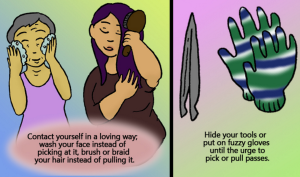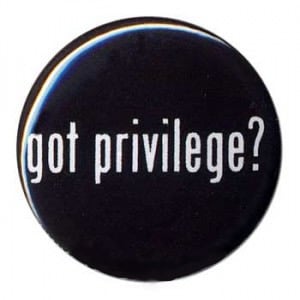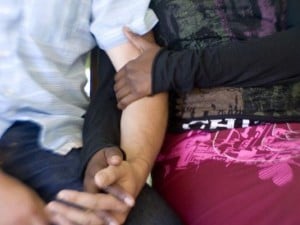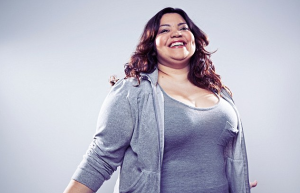Originally published on GirlTalkHQ and cross-posted here with their permission.
Editor’s Note: Everyday Feminism recognizes that not only women experience this issue. This article is written about one cis woman’s experience and how that might apply to others who hold that identity.
One premise-level misconception that often seems to surface when we talk about women who can’t get pregnant, or are dealing with pregnancy loss, is that there are two distinct types of women: 1) women who have an easy time getting pregnant or carrying a baby to term and 2) women who don’t.
I got pregnant for the first time in October 2013. Since then, 19 women I know have announced their pregnancies – more pregnancy announcements from women I know than any other time in my life.
And since October 2013, I’ve had three miscarriages.
Today, 12 of those 19 friends have given birth, and the rest are nearing the end of their healthy pregnancies. Meanwhile, I’m seeing a fertility specialist and, while optimistic, don’t know when or if I will have my own successful pregnancy.
Sometimes it feels like the universe is playing a cruel joke on me.
I don’t know why so many women I know suddenly seemed to have gotten pregnant at the same time as me, but I like to think the convergence shows that a successful pregnancy is possible for me, too. That’s the way I’m choosing to look at it, at least.
But I have, at times, caught myself thinking, “Why them, and not me?” I’ve caught myself thinking, “So and so got pregnant so easily.”
I’ve seen plenty of people think the same way. After my second miscarriage, one well-meaning pregnant friend said: “We’re rooting for you!” After I announced my third pregnancy, she told me the same thing. It was a nice sentiment, but it belied that distinction we all seem to make: There are women who can get pregnant easily, and there are women who have a terribly difficult time doing so.
By telling me that “they” were cheering me on, my pregnant friend also indicated something like “Those of us who have no problem getting pregnant are rooting for you because you’re on the infertility/miscarriage team!”
Of course, that’s not what she meant. When I talked to her about it, she understood how I could have interpreted her comment and was extremely apologetic and understanding. And with few exceptions, all the pregnant women and new moms I know have been supportive, loving, and helpful over the course of my failed pregnancies.
It’s tempting for us women dealing with fertility curve balls to isolate ourselves and fail to see the universality of our human experience. It’s tempting to think things like “Why did my friend get pregnant and not me?”
Yet we must try not to give into that temptation.
The truth of the matter is , we don’t always know other people’s pain.
Appearances can be deceiving. After I began having miscarriages, I began sharing these experiences on my blog. And to my surprise, many of my friends with children began to approach me with their own stories of pregnancy loss. Because they had at least one successful pregnancy, I subconsciously assumed they had done so without any of the complications I’ve experienced. This is default thinking, of course.
Infertility and pregnancy loss – even though it affects 6.7 million women (or approximately 11% of women 15–44) in the US alone – is not talked about in proportion to how common it actually is.
So those of us who are going through it may not have a frame of reference in the form of a friend or relative who has also gone through a similar experience.
In all likelihood, we actually have several friends and relatives who have experienced infertility and/or pregnancy loss, we just don’t know it. Of course, this lack of dialogue just bolsters our tendency to think of women as, essentially, fertile or infertile.
In turn, this binary way of thinking can lead us to either wishing “we” have what “they” have, or glad things are not as awful for “us” as they are for “them.” This is spiritually depleting. It’s also inaccurate. Women are not divided into two mutually exclusive camps, those who easily have successful pregnancies and those who are doomed to a life of fertility curve balls.
Thinking this way forces us to forget our unique, miraculous, sparkling, love-filled spirit.
I’m guilty of it at times – believe me, I am. But I strive to remember that I also have the gift of being me. That everything that is happening, is happening for me. And I don’t want to be anyone else but me – and all the experiences, painful and blissful – that go with being me.
***
For more on this topic, check out:
- 4 Ways to Stop the Silence and Stigma Around Miscarriages
- Men Feel the Pain of Infertility, Too
- Pregnancy and Mental Health: How One Psychiatrist Told Me Not to Have Kids
- 7 Things to Stop Saying to Pregnant People
- 6 Reasons Why Birthing Education Is a Reproductive Right
[do_widget id=”text-101″]
Search our 3000+ articles!
Read our articles about:
Our online racial justice training
Used by hundreds of universities, non-profits, and businesses.
Click to learn more





















